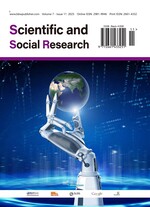Abstract
In the era of globalization and artificial intelligence, the cultivation of intercultural communication competence has become an essential goal of higher education. This paper adopts a problem–strategy framework to explore how AI-enhanced teaching can effectively promote communication competence among university students. It first identifies key challenges in the current intercultural education system, including limited authentic communication opportunities, insufficient teacher literacy in AI technologies, a lack of integration between technology and pedagogy, and inadequate evaluation systems. To address these issues, a set of AI-enhanced strategies is proposed, such as immersive learning environments, intelligent feedback systems, and teacher digital empowerment. The discussion aims to provide theoretical insights and practical guidance for universities seeking to modernize intercultural communication education in the age of digital intelligence.
References
Byram M, 2021, Teaching and Assessing Intercultural Communicative Competence: Revisited. Multilingual Matters. https://doi.org/10.21832/9781800410251
Deardorff DK, 2006, Identification and Assessment of Intercultural Competence as a Student Outcome of Internationalization. Journal of Studies in International Education, 2006(10): 241–266.
Gudykunst WB, 2003, Cross-Cultural and Intercultural Communication. Sage Publications, Inc.
Samovar LA, Porter RE, McDaniel ER, 2017, Communication between Cultures. Cengage Learning.
Ting-Toomey S, 1999, Communicating across Cultures. The Guilford Press, New York.
Yang M, Wu X, Deris FD, 2025, Exploring EFL learners’ Positive Emotions, Technostress and Psychological Well-being in AI-assisted Language Instruction with/without Teacher Support in Malaysia. British Educational Research Journal, published online. https://doi.org/10.1002/berj.4184
Dai DW, Zhu H, 2025, When AI Meets Intercultural Communication: New Frontiers, New Agendas. Applied Linguistics Review, 16 (2): 747–751. https://doi.org/10.1515/applirev-2024-0185
Zhu H, Dai DW, Brandt A, et al., 2025, Exploring AI for Intercultural Communication: Open Conversation. Applied Linguistics Review, 16(2): 809–824. https://doi.org/10.1515/applirev-2024-0186
Dong Y, 2023, Revolutionizing Academic English Writing through AI-powered Pedagogy: Practical Exploration of Teaching Process and Assessment. Journal of Higher Education Research, 4(2): 52. https://doi.org/10.32629/jher.v4i2.1188
Ghafar ZN, Salh HF, Abdulrahim MA, et al., 2023, The Role of Artificial Intelligence Technology on English Language Learning: A Literature Review. Canadian Journal of Language and Literature Studies, 3(2): 17–31. https://doi.org/10.53103/cjlls.v3i2.87
Xia Y, Shin SY, Kim JC, 2024, Cross-cultural Intelligent Language Learning System (CILS): Leveraging AI to Facilitate Language Learning Strategies in Cross-cultural Communication. Applied Sciences, 14(13): 5651. https://doi.org/10.3390/app14135651
Rahiman HU, Kodikal R, 2023, Revolutionizing Education: Artificial Intelligence Empowered Learning in Higher Education. Cogent Education, 11(1): 2293431. https://doi.org/10.1080/2331186X.2023.2293431
Cheng L, 2024, A Study of Enhancing University Students’ Information Literacy and Global Communicative Competence. International Journal of Learning and Teaching, 10(2): 214–217. https://doi.org/10.18178/ijlt.10.2.214-217
Long J, Lin J, 2022, An Empirical Study on Cultivating College Students’ Cross-cultural Communicative Competence Based on the Artificial-Intelligence English-teaching Mode. Frontiers in Psychology, 2022(13): 976310. https://doi.org/10.3389/fpsyg.2022.976310
Seo K, Tang J, Roll I, et al., 2021, The Impact of Artificial Intelligence on Learner–Instructor Interaction in Online Learning. International Journal of Educational Technology in Higher Education, 18(1): 54. https://doi.org/10.1186/s41239-021-00292-9
Jenks CJ, 2025, Communicating the Cultural Other: Trust and Bias in Generative AI and Large Language Models. Applied Linguistics Review, 16(2): 787–795. https://doi.org/10.1515/applirev-2024-0196
McCallum L, 2024, New Takes on Developing Intercultural Communicative Competence: Using AI Tools in Telecollaboration Task Design and Task Completion. Journal for Multicultural Education, 18(1/2): 153–172. https://doi.org/10.1108/JME-06-2023-0043
Kamalov F, Santandreu Calonge D, Gurrib I, 2023, New Era of Artificial Intelligence in Education: Towards a Sustainable Multifaceted Revolution. Sustainability, 2023(15): 12451. https://doi.org/10.3390/su151612451
Klimova B, Chen JH, 2024, The Impact of AI on Enhancing Students’ Intercultural Communication Competence at the University Level: A Review Study. Language Teaching Research Quarterly, 2024(43): 102–120. https://doi.org/10.32038/ltrq.2024.43.06
Hall ET, 1976, Beyond Culture. Anchor Press/Doubleday.
Hofstede G, 2001, Culture’s Consequences: Comparing Values, Behaviors, Institutions, and Organizations Across Nations (2nd ed.). Sage Publications.
Ismailov M, 2021, Virtual Exchanges in an Inquiry-based Learning Environment: Effects on Intra-Cultural Awareness and Intercultural Communicative Competence. Cogent Education, 8(1): 1982601. https://doi.org/10.1080/2331186X.2021.1982601
O’Regan JP, Ferri G, 2025, Artificial Intelligence and Depth Ontology: Implications for Intercultural Ethics. Applied Linguistics Review, 16(2): 797–807. https://doi.org/10.1515/applirev-2024-0189
